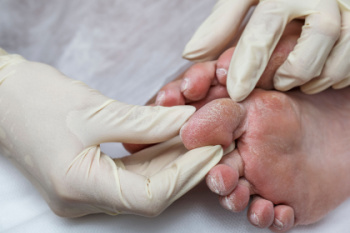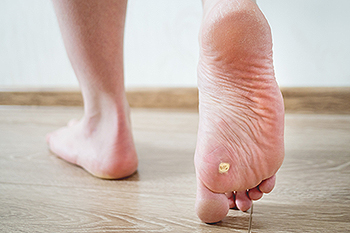Connect With Us
Blog
We Can Treat Your Foot or Ankle Pain
The Impact of Diabetes on Foot Health

Diabetes poses significant risks to foot health, highlighting the importance of vigilant care and preventive measures. Elevated blood sugar levels can damage nerves, known as neuropathy, and reduce blood flow, impairing sensation and circulation in the feet. Neuropathy diminishes the ability to feel pain, heat, or cold, increasing the likelihood of unnoticed injuries or wounds. Additionally, reduced blood flow hampers the body's ability to heal, increasing the risk of foot infections and ulcers. Diabetes also heightens susceptibility to foot complications like corns, calluses, and fungal infections due to impaired immune function. Charcot foot, a severe condition characterized by weakened bones and joint deformities, is another complication of diabetes that can lead to disability without proper care. To mitigate these risks, individuals with diabetes must adopt a comprehensive foot care regimen. If you have diabetes, it is strongly suggested that you are under the care of a podiatrist who can help you to manage the effects of this condition on your feet.
Diabetic foot care is important in preventing foot ailments such as ulcers. If you are suffering from diabetes or have any other concerns about your feet, contact one of our podiatrists from Foot & Ankle Associates of Maine. Our doctors can provide the care you need to keep you pain-free and on your feet.
Diabetic Foot Care
Diabetes affects millions of people every year. The condition can damage blood vessels in many parts of the body, especially the feet. Because of this, taking care of your feet is essential if you have diabetes, and having a podiatrist help monitor your foot health is highly recommended.
The Importance of Caring for Your Feet
- Routinely inspect your feet for bruises or sores.
- Wear socks that fit your feet comfortably.
- Wear comfortable shoes that provide adequate support.
Patients with diabetes should have their doctor monitor their blood levels, as blood sugar levels play such a huge role in diabetic care. Monitoring these levels on a regular basis is highly advised.
It is always best to inform your healthcare professional of any concerns you may have regarding your feet, especially for diabetic patients. Early treatment and routine foot examinations are keys to maintaining proper health, especially because severe complications can arise if proper treatment is not applied.
If you have any questions please feel free to contact our office located in Brunswick, ME . We offer the newest diagnostic and treatment technologies for all your foot and ankle needs.
Protecting Your Feet in Hot Working Environments

When working in scorching temperatures, protecting your feet is essential for maintaining comfort and preventing heat-related injuries. Begin by choosing appropriate footwear designed for hot conditions, such as lightweight and breathable shoes or boots with moisture-wicking properties. Opt for materials like mesh or perforated leather to facilitate air circulation and keep your feet cool and dry. Additionally, consider wearing moisture-wicking socks to help prevent sweat buildup and reduce the risk of blisters and fungal infections. It is also important to prioritize foot hygiene by washing your feet regularly and changing socks if they become damp. When possible, take breaks in shaded or air-conditioned areas to allow your feet to cool down and rest. Stay hydrated throughout the day to prevent dehydration, which can exacerbate heat-related foot issues. By implementing these simple yet effective strategies, you can ensure that your feet remain protected and comfortable while working in hot environments, promoting overall well-being and productivity. If you sustain heat-related foot injuries or are seeking additional tips about foot protection while working during the summer months, it is suggested that you consult a podiatrist.
While working on the feet, it is important to take the proper care of them. For more information about working on your feet, contact one of our podiatrists from Foot & Ankle Associates of Maine. Our doctors will treat your foot and ankle needs.
Working on Your Feet
Standing on your feet for long periods of time can cause stress and pain in your feet. Your whole body may experience change in terms of posture, back pain, bunions, callouses and or plantar warts. There are ways to avoid these conditions with proper foot care, smart choices and correct posture.
Positive Changes
Negative heeled shoe – Choosing this shoe type places the heel slightly lower than the ball of the foot. These are great for overall foot health. Find shoes that fit you correctly.
Go barefoot – Our feet were not designed to be enclosed for all hours of the day. Try to periodically expose your feet to air.
Eliminate Pain
Foot Exercises – Performing simple exercises, incorporating yoga and doing stretches are beneficial. This will allow increased blood flow to the area and muscles of the foot.
Achilles tendon – Stretching the foot out flat on the floor will relax the calf muscles and tendon. These exercises can be performed almost anywhere. Make sure you add these exercises to your daily regimen.
With a little bit of this information and knowing more about foot health, you will notice changes. Foot stretches and proper footwear will help with pain and prevent further issues.
If you have any questions please feel free to contact our office located in Brunswick, ME . We offer the newest diagnostic and treatment technologies for all your foot and ankle needs.
Causes of Plantar Warts

Plantar warts, which affect the bottom of the feet, can resolve naturally or may require treatment. Caused by the human papillomavirus, or HPV, these warts thrive in warm and moist environments, such as locker rooms. HPV enters the body through cuts or scrapes, making those individuals with weakened immune systems more susceptible. Symptoms can include pain, tenderness, and thickened or discolored skin. Diagnosis by a podiatrist is recommended, especially if the wart causes pain or spreads. Treatment options range from salicylic acid to cryotherapy by a podiatrist. Consistency is key, as most treatments can take weeks to be effective. Prevention strategies include wearing protective footwear in shared spaces and considering the HPV vaccine for those under 26. If you or your child suffers from discomfort from a plantar wart, it is suggested that you schedule an appointment with a podiatrist for evaluation and care.
Plantar warts can be very uncomfortable. If you need your feet checked, contact one of our podiatrists from Foot & Ankle Associates of Maine. Our doctors will assist you with all of your foot and ankle needs.
About Plantar Warts
Plantar warts are the result of HPV, or human papillomavirus, getting into open wounds on the feet. They are mostly found on the heels or balls of the feet.
While plantar warts are generally harmless, those experiencing excessive pain or those suffering from diabetes or a compromised immune system require immediate medical care. Plantar warts are easily diagnosed, usually through scraping off a bit of rough skin or by getting a biopsy.
Symptoms
- Lesions on the bottom of your feet, usually rough and grainy
- Hard or thick callused spots
- Wart seeds, which are small clotted blood vessels that look like little black spots
- Pain, discomfort, or tenderness of your feet when walking or standing
Treatment
- Freezing
- Electric tool removal
- Laser Treatment
- Topical Creams (prescription only)
- Over-the-counter medications
To help prevent developing plantar warts, avoid walking barefoot over abrasive surfaces that can cause cuts or wounds for HPV to get into. Avoiding direct contact with other warts, as well as not picking or rubbing existing warts, can help prevent the further spread of plantar warts. However, if you think you have developed plantar warts, speak to your podiatrist. He or she can diagnose the warts on your feet and recommend the appropriate treatment options.
If you have any questions please feel free to contact our office located in Brunswick, ME . We offer the newest diagnostic and treatment technologies for all your foot and ankle needs.

